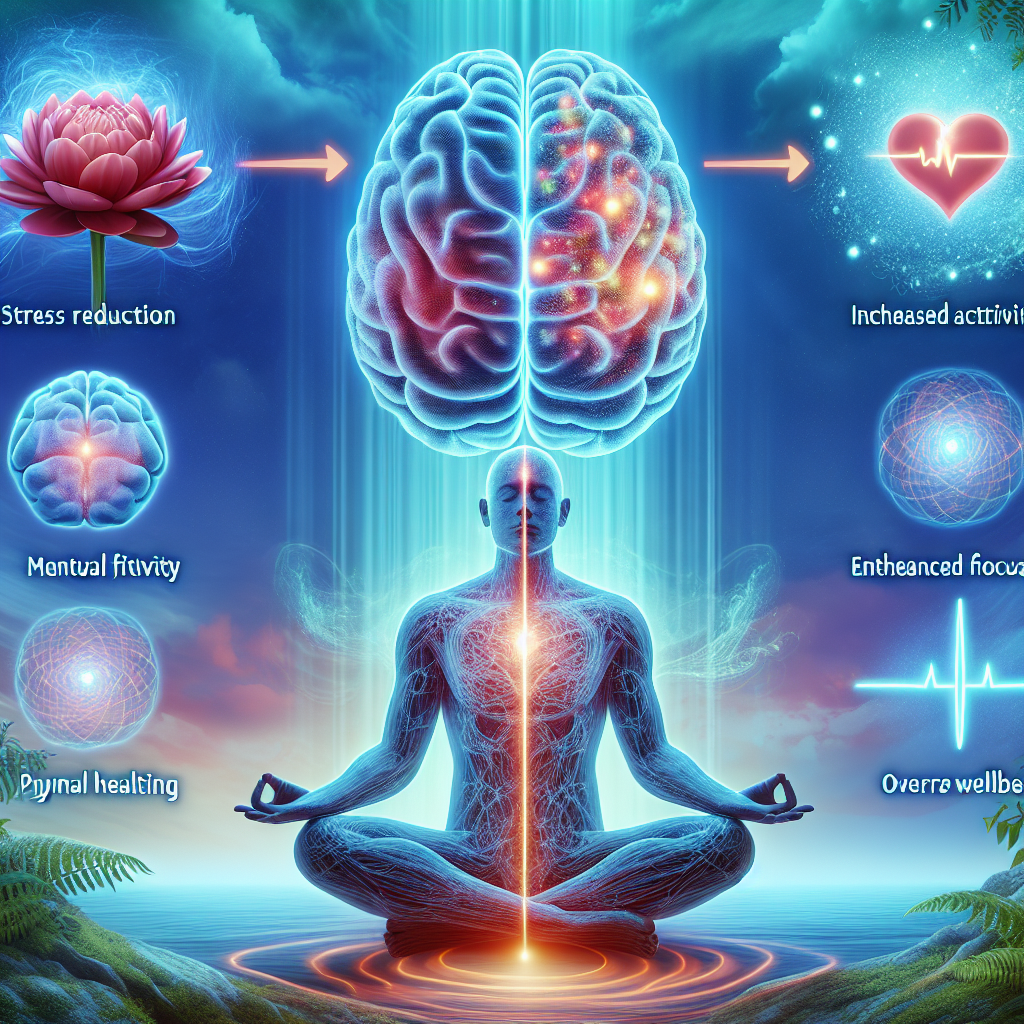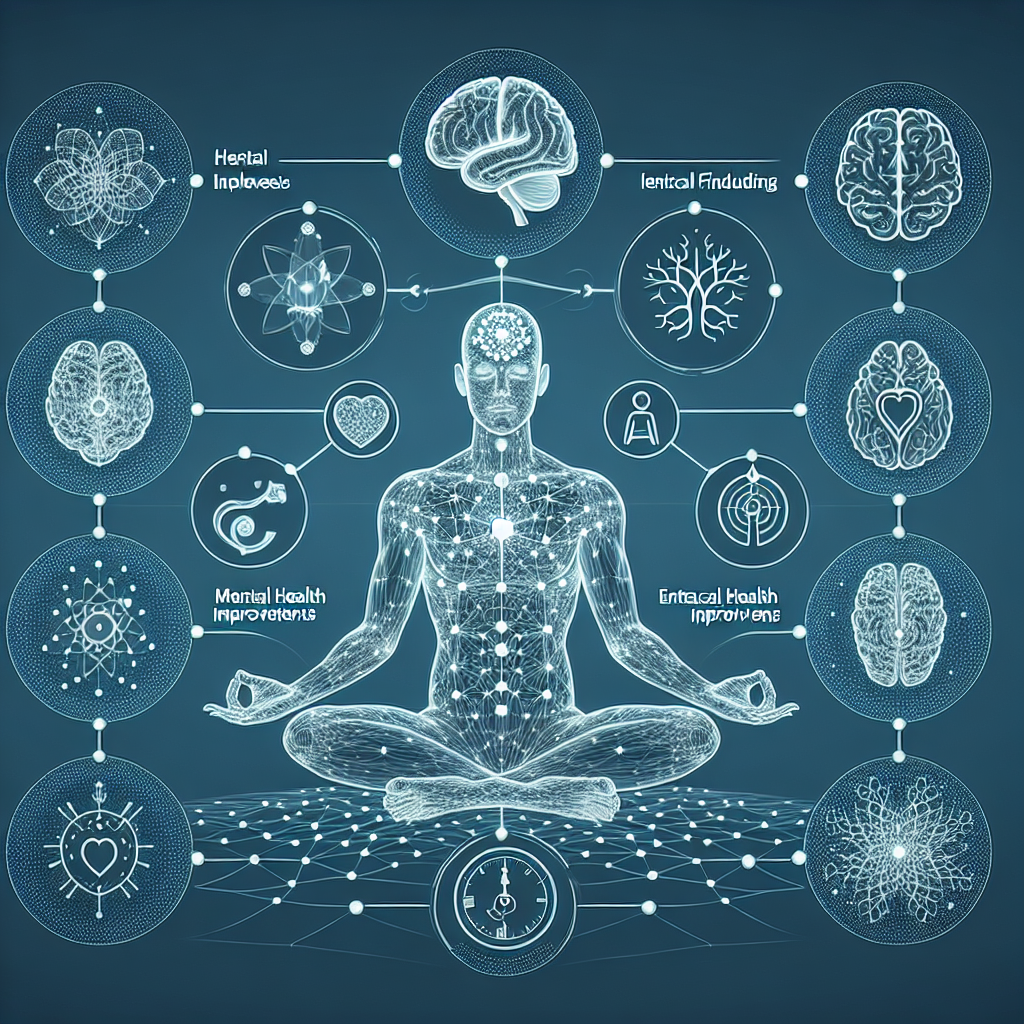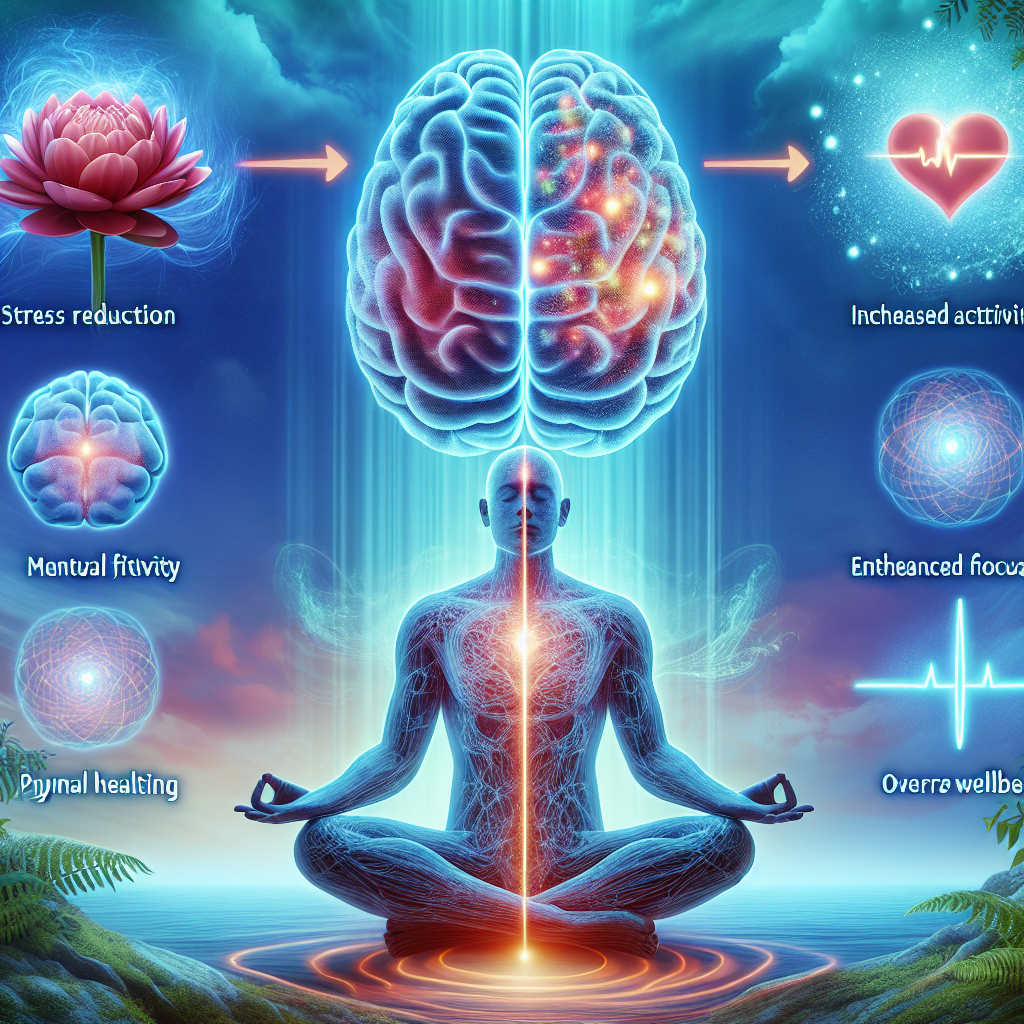You’ve probably heard about the many benefits of meditation – reducing stress, improving focus, and increasing overall wellbeing. But have you ever wondered if meditation actually has the power to change the very structure and function of your brain? Well, science seems to say yes. Research has shown that regular meditation practice can lead to significant alterations in the brain, including increases in grey matter volume, changes in neural connectivity, and improvements in cognitive abilities. So, let’s explore the fascinating world of meditation and its transformative effects on the brain.

What is Meditation?
Meditation is a practice that involves training your mind to focus and redirect your thoughts. It is often used to increase awareness of the present moment, reduce stress and anxiety, promote emotional well-being, and enhance clarity of thought. Meditation has been practiced for centuries and is rooted in various religious and spiritual traditions. In recent years, it has gained popularity as a secular practice for individuals looking to improve their mental and emotional health.
Different Types of Meditation
There are various types of meditation, each with its own unique techniques and goals. Some popular forms of meditation include:
Mindfulness Meditation
Mindfulness meditation involves paying attention to the present moment without judgment. It focuses on observing thoughts, emotions, and sensations as they arise without getting caught up in them. The goal is to cultivate a sense of awareness and acceptance of whatever is happening in the present moment.
Loving-Kindness Meditation
Loving-kindness meditation, also known as Metta meditation, involves directing well-wishes and compassion to oneself and others. It aims to cultivate feelings of love, kindness, and empathy towards oneself and others, even towards those with whom one may have difficulty.
Transcendental Meditation
Transcendental meditation involves the use of a mantra, a specific word or phrase repeated silently or aloud, to achieve a state of deep relaxation and mental clarity. The focus is on experiencing a transcendent state of consciousness and inner peace.
Zen Meditation
Zen meditation, also known as Zazen, is a form of meditation practiced in Zen Buddhism. It involves sitting in a specific posture, usually in a quiet and focused environment, and observing the breath and the thoughts that arise without attachment or judgment.
These are just a few examples of the multitude of meditation techniques that exist. Each type of meditation has its own unique benefits and methods, allowing individuals to choose the practice that resonates most with them.
Benefits of Meditation
Meditation has been shown to have a wide range of benefits for both mental and physical health. Some of the key benefits include:
Reduced Stress and Anxiety
One of the most well-known benefits of meditation is its ability to reduce stress and anxiety. Regular meditation practice has been shown to lower levels of the stress hormone cortisol, leading to a decrease in overall stress and a greater sense of calm and relaxation.
Improved Attention and Concentration
Meditation can significantly improve attention and concentration. By training the mind to focus and redirect thoughts, meditation strengthens the brain’s ability to sustain attention, leading to improved focus and productivity in daily activities.
Enhanced Emotional Regulation
Emotional regulation refers to the ability to manage and control one’s emotions effectively. Meditation has been found to enhance emotional regulation by promoting self-awareness and cultivating non-reactivity to negative emotions. This can lead to greater emotional resilience and a more positive outlook on life.
Increased Self-Compassion
Meditation encourages individuals to cultivate self-compassion, the ability to treat oneself with kindness, understanding, and care. This practice of self-compassion can improve self-esteem, reduce self-criticism, and promote overall well-being.
Better Sleep Quality
Regular meditation practice has been associated with improved sleep quality. By reducing stress and promoting relaxation, meditation can help individuals achieve a calm state of mind before sleep, leading to more restful and rejuvenating sleep.
Improved Relationships
Through practices like loving-kindness meditation, individuals can cultivate feelings of love, kindness, and empathy towards themselves and others. These qualities can lead to improved relationships, increased empathy, and social connection.
These are just a few of the many benefits that meditation can offer. As research in this area continues to expand, more insights into the positive effects of meditation on various aspects of well-being are emerging.
Effects of Meditation on Brain Structure
Meditation has been found to have significant effects on the structure of the brain. Neuroimaging studies have shown several notable changes in brain structure associated with meditation.
Increase in Gray Matter
Gray matter refers to the tissue in the brain that contains the majority of neuronal cell bodies. Research has shown that regular meditation practice can lead to an increase in the volume and density of gray matter in various regions of the brain. These structural changes have been observed in areas responsible for attention, memory, emotional regulation, and self-awareness.
Changes in Cortical Thickness
Cortical thickness refers to the thickness of the outer layer of the brain, known as the cerebral cortex. Studies have found that meditation can lead to an increase in cortical thickness in regions associated with cognitive functions, such as attention, concentration, and sensory processing.
Enhanced Connectivity between Brain Regions
Meditation has also been found to enhance the connectivity between different brain regions. This improved connectivity allows for more efficient communication between regions involved in attention, emotion regulation, and cognitive processes. These changes may contribute to the observed improvements in attention, emotional regulation, and cognitive abilities associated with meditation.
The structural changes observed in the brain as a result of meditation highlight the brain’s remarkable ability to adapt and change in response to mental training.

Effects of Meditation on Brain Function
In addition to its effects on brain structure, meditation has also been found to have significant effects on brain function. Neuroimaging studies have demonstrated various changes in brain activity and connectivity associated with meditation.
Improved Attention and Concentration
Meditation has been consistently shown to improve attention and concentration. Neuroimaging studies have revealed that meditation practice increases activity in the prefrontal cortex, a region of the brain responsible for executive functions such as attention and decision-making. This increased activity is thought to underlie the improved focus and attention observed in individuals who regularly practice meditation.
Enhanced Emotional Regulation
Meditation has a profound impact on emotional regulation. Brain imaging studies have shown that meditation practice reduces activity in the amygdala, a region of the brain associated with the processing of emotions. This reduced activity allows individuals to experience emotions without becoming overwhelmed, leading to greater emotional well-being and resilience.
Reduced Stress and Anxiety
Meditation practice has been found to modulate the brain’s stress response system. Neuroimaging studies have shown that meditation decreases activity in the default mode network, a network of brain regions involved in self-referential thinking and mind-wandering. This reduced activation of the default mode network is associated with decreased rumination, worry, and anxiety.
The effects of meditation on brain function highlight the ability of this practice to reshape the brain’s neural pathways and enhance various cognitive and emotional processes.
Impact of Meditation on Neuroplasticity
Neuroplasticity refers to the brain’s ability to change and reorganize itself throughout life in response to experiences and environmental influences. Meditation has been found to promote neuroplasticity and facilitate positive changes in the brain.
Neuroplasticity and Meditation
Research has shown that regular meditation practice can enhance neuroplasticity, allowing the brain to develop new neural connections and strengthen existing ones. This plasticity is believed to be responsible for the structural and functional changes observed in the brains of long-term meditators.
How Meditation Promotes Neuroplasticity
Meditation promotes neuroplasticity through several mechanisms. First, the focused attention and mental training involved in meditation strengthen the connections between different brain regions, allowing for more efficient information processing. Second, the cultivation of mindfulness and non-reactivity in meditation helps individuals become aware of and change their habitual patterns of thinking and behavior. This flexibility of mind is a crucial aspect of neuroplasticity. Finally, meditation’s ability to reduce stress and enhance emotional regulation creates an optimal environment for neuroplasticity by reducing the negative impact of chronic stress on the brain.
Through its promotion of neuroplasticity, meditation offers individuals the opportunity to actively shape and transform their brain structure and function, leading to enhanced well-being and mental resilience.
Meditation and Stress Reduction
Stress is an inevitable part of life, but chronic stress can have detrimental effects on both the brain and the body. Fortunately, meditation has been shown to be an effective tool for reducing stress and its harmful effects.
Effects of Stress on the Brain
Chronic stress has been associated with various negative effects on brain structure and function. Prolonged exposure to stress hormones can lead to a decrease in gray matter volume, particularly in areas responsible for memory, learning, and emotional regulation. Stress can also disrupt the balance of neurotransmitters in the brain, leading to mood disorders such as anxiety and depression.
Meditation as a Stress Reduction Tool
Meditation provides an effective means of managing and reducing stress. By engaging in regular meditation practice, individuals can activate the body’s relaxation response, counteracting the harmful effects of chronic stress. Meditation helps regulate the stress response by reducing the production of stress hormones, increasing the availability of feel-good neurotransmitters like serotonin, and promoting a sense of calm and relaxation.
Moreover, meditation encourages individuals to develop a more mindful and non-reactive attitude towards stressors, enabling them to navigate stressful situations with greater ease and resilience. By incorporating meditation into their daily routine, individuals can effectively manage stress and improve their overall well-being.
Meditation and Emotional Well-being
Emotional well-being is a key aspect of mental health and encompasses the ability to understand, manage, and express emotions in a healthy and adaptive manner. Meditation has been found to have a profound impact on emotional well-being, offering individuals effective tools for regulating their emotions.
Regulation of Emotions through Meditation
Meditation enables individuals to cultivate emotional regulation skills by fostering self-awareness and non-reactivity to emotions. By practicing mindfulness, individuals can observe their thoughts and emotions as they arise without judgment, creating a space for greater self-reflection and understanding. Through this process, individuals can develop the capacity to identify and regulate emotions more effectively, reducing emotional distress and increasing emotional stability.
Meditation for Depression and Anxiety
Meditation has shown promise as a complementary treatment for depression and anxiety. Studies have found that regular meditation practice can reduce symptoms of depression and anxiety by promoting positive emotions, increasing self-compassion, and reducing rumination. Meditation can also help individuals develop a more balanced and non-judgmental perspective towards their emotions, creating a sense of empowerment and control over their mental health.
By incorporating meditation into their daily routine, individuals can cultivate emotional well-being and develop healthy coping strategies for navigating life’s challenges.
Meditation and Cognitive Abilities
Cognitive abilities refer to a range of mental processes, including memory, attention, problem-solving, and creativity. Meditation has been found to have a positive impact on various aspects of cognitive functioning, enhancing these abilities and promoting mental clarity.
Improvement in Memory and Attention
Regular meditation practice has been shown to improve both short-term and long-term memory. By enhancing attention and focus, meditation strengthens the brain’s ability to encode and retrieve information, leading to improved memory performance. Additionally, meditation promotes mindfulness, which has been found to enhance working memory – the ability to hold and manipulate information in the mind.
Enhancement of Creativity
Meditation has also been associated with increased creativity. By quieting the mind and reducing cognitive overload, meditation creates a state of mental clarity and openness that allows for the emergence of new ideas and insights. This enhanced creativity can be applied to various domains, including problem-solving, artistic pursuits, and innovative thinking.
The cognitive benefits of meditation offer individuals practical tools for improving their mental performance and expanding their creative potential.
Meditation and Aging Brain
As individuals age, the brain naturally undergoes changes that can impact cognitive function and overall brain health. Fortunately, meditation has been shown to have a protective effect on the aging brain, preserving cognitive function and delaying age-related decline.
Preservation of Brain Function with Meditation
Research has revealed that regular meditation practice can slow down age-related changes in the brain. Long-term meditators have been found to have better-preserved cognitive abilities and a reduced risk of developing age-related neurodegenerative diseases, such as Alzheimer’s disease and dementia. The structural and functional improvements observed in the brains of meditators contribute to this preservation of brain function.
Delaying Age-Related Cognitive Decline
Meditation promotes brain health and resilience by enhancing neuroplasticity, reducing stress, and improving cognitive abilities. These factors, combined with the ability of meditation to regulate emotions and promote emotional well-being, contribute to the preservation of cognitive function with age. By incorporating meditation into their daily lives, individuals can take proactive steps to maintain and enhance their brain health as they age.
Meditation and Neuroscience Research
The effects of meditation on the brain have been a topic of interest for neuroscientists and researchers. Over the past few decades, numerous studies have examined the structural and functional changes that occur in the brain as a result of meditation.
Studies on Meditation and Brain Changes
Neuroimaging studies, such as functional magnetic resonance imaging (fMRI) and electroencephalography (EEG), have provided valuable insights into the effects of meditation on the brain. These studies have consistently shown that meditation practice leads to structural and functional changes in regions involved in attention, emotional regulation, and cognitive processes.
Neuroimaging Techniques in Meditation Research
fMRI has been instrumental in revealing the changes in brain activity associated with meditation. By measuring blood flow and oxygenation levels in different regions of the brain, fMRI can identify the specific brain networks and areas that are activated during meditation.
EEG has also been used to study the effects of meditation on brain activity. By recording the electrical activity of the brain, EEG can detect changes in brainwave patterns associated with different states of consciousness, such as relaxation or focused attention.
These neuroimaging techniques, in combination with behavioral and self-report measures, have provided a comprehensive understanding of the effects of meditation on the brain and its potential benefits for mental and emotional well-being.
Conclusion
Meditation is a powerful practice that offers numerous benefits for physical and mental health. Through its ability to reshape the structure and function of the brain, meditation promotes emotional well-being, cognitive abilities, and overall brain health. The effects of meditation on the brain, as revealed through neuroscience research, highlight the transformative power of this ancient practice. By incorporating meditation into your daily routine, you can harness the potential of your brain to cultivate a greater sense of well-being, resilience, and clarity of mind. So why not give it a try and embark on a journey of self-discovery and inner peace through meditation?
